'이존영' 기자의 전체기사
-
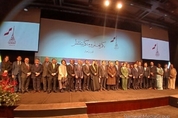
Diplomacy Embassy of Qatar in Korea Hosts National Day Reception in Se…
Diplomacy Journal Kayla Lee | The Embassy of the State of Qatar in the Republic of Korea hosted a National Day reception on December 15 at the Shilla Hotel in Seoul, bringing together senior government officials, members of the diplomatic corps, business leaders, and cultural figures to celebrate Qatar’s National Day and the steadily deepening ties between Qatar and Korea. The event commemorated the accession of Sheikh Jassim bin Mohammad Al Thani, the founder of the State of Qatar, and was hosted by H.E. Khalid Ebrahim Al-Hamar, Ambassador of the State of Qatar to the Republic of Korea. Compr
- 이존영 기자
- 2025-12-19 13:33
-
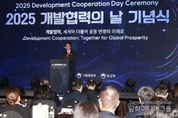
Local Prime Minister Kim attends the International Development Coo…
By Diplomacy Journal Lee Jon-young The government held a ceremony to commemorate International Development Cooperation Day at the Plaza Hotel in Seoul on Nov. 25. International Development Cooperation Day, commemorating Korea's accession to the OECD Development Assistance Committee (DAC) on November 25, 2009, was designated as a statutory holiday under the Framework Act on International Development Cooperation this year. Approximately 250 people, including Prime Minister Kim Min-seok, foreign ambassadors to Korea, heads of international organizations in Korea, the Chairman of the Korea Interna
- 이존영 기자
- 2025-11-27 11:45
-
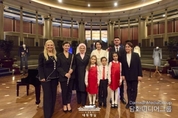
Diplomacy First Lady Kim holds a social engagement with Mrs. Erdoğan…
By Diplomacy Journal Lee Jon-young First Lady Kim Hye-kyung, accompanying President Lee Jae-myung on his visit to Türkiye, held a social engagement and conversation with Mrs. Emine Erdoğan, the First Lady of Türkiye, on Nov. 24. Following their visit to the Museum of Civilizations, the focus was on touring the National Library and attending cultural and artistic events. First, the two ladies visited the Korea Corner within the National Library of Türkiye. In the space stocked with various Korean books, including Korean language and Korean novels, Mrs. Erdoğan introduced, “The popularity of the
- 이존영 기자
- 2025-11-26 11:02
-
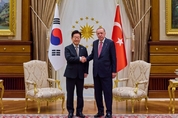
Diplomacy President Lee Jae-myung holds a summit with President Erdo…
By Diplomacy Journal Lee Jon-young President Lee Jae-myung held a summit with President Recep Tayyip Erdogan of Turkiye on Nov. 24. A nuclear power cooperation between Korea and Turkiye was included at the Memorandum of Understanding (MOU) signed at the South Korea-Turkey summit, the Office of the President announced. The scope of cooperation included reactor technology, site assessment, regulations and licensing, financing and business models, and nuclear power plant project implementation. To this end, the two sides agreed to establish a joint working group, share information, experience, kn
- 이존영 기자
- 2025-11-25 11:32
-
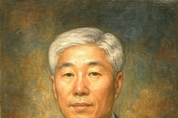
Local [Publisher Column] "The moment trust is broken, diplomacy…
By Diplomacy Journal Lee Jon-young Trust. When this one word is broken, even the strongest national power loses its persuasiveness, and even the most eloquent diplomatic messages return as empty echoes. Today's international society is a complex web of intertwined national interests. Consequently, "consistency between words and actions" plays a greater role in diplomacy than ever before. However, reality is different. A "Myeonjongbokbae (面從腹背 outwardly obedient, yet inwardly betraying) attitude— is evident throughout international relations. This duplicity in diplomacy recurs not only between
- 이존영 기자
- 2025-11-25 10:38
-
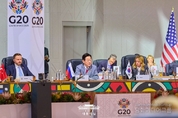
Diplomacy President Lee says at G20 Summit, "WTO restoration is in everyo…
By Diplomacy Journal Lee Jon-young At the G20 Summit held in Johannesburg, South Africa on Nov. 22 (local time), President Lee Jae-myung proposed, "To enhance growth potential, we must create a predictable trade and investment environment. President Lee emphasized the importance of multilateral trade, saying, "Restoring the functions of the World Trade Organization (WTO) is in our common interest." He also emphasized the importance of multilateral trade. Notably, Korea has agreed to host the G20 again in 2028, its first in 18 years since 2010. In the first session of the G20 Summit, President
- 이존영 기자
- 2025-11-24 10:48
-
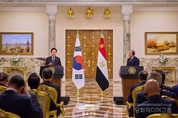
Diplomacy President Lee holds a summit with Egyptian President Abdel…
By Diplomacy Journal Lee Jon-young President Lee Jae-myung, currently on an official visit to Egypt, stated, “Korea and Egypt have agreed to jointly contribute to international peace, including on the Korean Peninsula and in the Middle East, as ‘peace promoters.’” President Lee announced the results of the summit during a joint press conference with President Abdel Fattah el-Sisi at the Egyptian Presidential Palace on Nov. 20 local time. President Lee explained, “During the talks, we held in-depth discussions on the recent situations on the Korean Peninsula and in the Middle East,” adding, “Pr
- 이존영 기자
- 2025-11-21 11:26
-
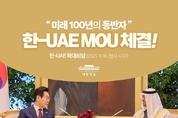
Diplomacy President Lee holds summit with UAE President Mohamed bin…
By Diplomacy Journal Lee Jon-young | President Lee Jae-myung stated during his summit with UAE President Mohamed bin Zayed Al Nahyan, “I hope this visit will serve as an opportunity for the cooperative relationship between Korea and the UAE to become truly broader, deeper, and more special.” President Lee made these remarks during the expanded summit meeting between South Korea and the UAE held at the Presidential Palace in Abu Dhabi, UAE, on Nov. 18 (local time). President Lee is on a state visit to the UAE from the 17th to the 19th, a two-night, three-day itinerary. President Lee remarked, “
- 이존영 기자
- 2025-11-19 11:29
-
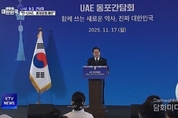
Global President Lee Jae-myung: “UAE to serve as Korea’s base…
By Diplomacy Journal Lee Jon-young President Lee Jae-myung, on a Middle East and Africa tour, held a dinner meeting with Korean compatriots in Abu Dhabi on Nov. 17 (local time) to encourage Korean nationals in the United Arab Emirates (UAE). Approximately 150 people attended this meeting, including representatives of compatriot organizations, businesspeople, members of the Advisory Council for Democratic Peaceful Reunification, Korean language school officials, cultural and artistic figures, and employees of international organizations. Jang Kwang-deok, President of the Korean Association in t
- 이존영 기자
- 2025-11-18 15:16
-
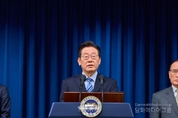
Diplomacy President Lee to attend G20 Summit and visit three Middle Eas…
By Diplomacy Journal Lee Jon-young President Lee Jae-myung departed on a trip from Nov. 17 to 26 to attend the G20 Summit in South Africa and visit three Middle Eastern countries: the UAE, Egypt, and Türkiye. National Security Advisor Wi Sung-lac announced the presidential itinerary during a briefing on Nov. 14. President Lee will pay a state visit to the United Arab Emirates (UAE) from the 17th to the 19th, followed by an official visit to Egypt from the 19th to the 21st. He will then attend the G20 Summit in South Africa from the 21st to the 23rd, before making a state visit to Türkiye from
- 이존영 기자
- 2025-11-17 11:27
-
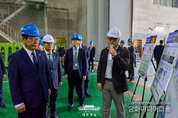
Local President Lee visits Korea Superconducting Tokamak Adva…
By Diplomacy Journal Lee Jon-young President Lee Jae-myung visited the Korea Institute of Fusion Energy (KFE) in the Daedeok Research Complex in Daejeon ahead of the national briefing session titled "A Republic of Korea Dreaming of Scientists and Engineers Again" on Nov. 7. The visit was designed to hear about the progress of nuclear fusion R&D, a future energy source to address the rapidly increasing electricity demand and carbon neutrality in the AI era, and to commend the researchers' efforts. President Lee toured the KSTAR (Korea Superconducting Tokamak Advanced Research) facility, the
- 이존영 기자
- 2025-11-10 10:31
-
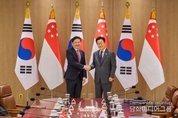
Diplomacy President Lee holds a summit with Singaporean Prime Ministe…
By Diplomacy Journal Lee Jon-young President Lee Jae-myung held a summit with Singaporean Prime Minister Lawrence Wong on Nov. 2 and agreed to establish a "strategic partnership" between the two countries, deepening cooperation in the areas of economy and security. Following the summit with Prime Minister Wong at the Presidential Office in Yongsan, President Lee issued a joint press release stating, "We agreed that the international order that has supported global growth and prosperity is being shaken, and that strategic cooperation between our two countries is crucial in the face of global ch
- 이존영 기자
- 2025-11-05 10:27
-
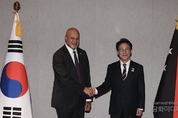
Diplomacy Prime Minister Kim meets with Papua New Guinea's Deputy Prime…
By Diplomacy Journal Lee Jon-young Prime Minister Kim met with Papua New Guinea Deputy Prime Minister John Rosso, who was in Korea for the APEC Summit, and discussed ways to further develop cooperative relations on Oct. 31. During the meeting, Prime Minister Kim stated, "I hope to further develop diplomatic relations between our two countries and strengthen substantive cooperation. Let's discuss various ways to strengthen cooperation, such as at the Korea-Pacific Islands Foreign Ministers' Meeting scheduled for Seoul later this year." Deputy Prime Minister Rosso said, "Korean companies have co
- 이존영 기자
- 2025-11-04 15:03
-
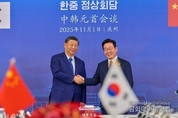
Diplomacy President Lee holds first summit with Chinese President Xi Jin…
By Diplomacy Journal Lee Jon-young President Lee Jae-myung held his first summit on Nov. 1 with Chinese President Xi Jinping, who was visiting South Korea as a state guest for the first time in 11 years. The summit focused on establishing a direction for the development of South Korea-China relations that would contribute substantially to the livelihoods of the people of both countries, based on the shared understanding between the two leaders that "people's livelihoods are paramount." The South Korea-China summit featured in-depth discussions on a variety of pending issues, including ways to
- 이존영 기자
- 2025-11-03 10:32
-
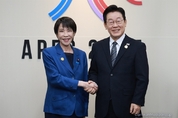
Diplomacy President Lee holds summit with Japanese Prime Minister Sa…
By Diplomacy Journal Lee Jon-young President Lee Jae-myung held his first summit with Japanese Prime Minister Sanae Takaichi on October 30 and discussed ways to cooperate between the two countries. The summit took place at 6:02 p.m. at the Hwabaek Convention Center in Gyeongju, North Gyeongsang Province, where the APEC (Asia-Pacific Economic Cooperation) Summit was being held. This marked President Lee's third summit with Japan since taking office and his first face-to-face meeting with Prime Minister Takaichi since her inauguration. President Lee stated, "I am truly delighted to meet you for
- 이존영 기자
- 2025-10-31 15:14
-
2025-12-25 23:06
2026. How U.S.–China Rivalry and Trilateral Supply Chains Are Redefining Indo-Pacific Order
-
2025-12-24 03:11
KOREAZ Awards Highlight Korea’s Youth-Centered Digital Diplomacy Strategy
-
2025-12-19 13:33
Embassy of Qatar in Korea Hosts National Day Reception in Seoul
-
2025-12-19 13:23
Uzbekistan–Japan: Expanding the Boundaries of Strategic Partnership
-
2025-12-18 23:23
Instituto Cervantes in Seoul presented principal works of Guatemala's First Nobel Laureate in Literature

















